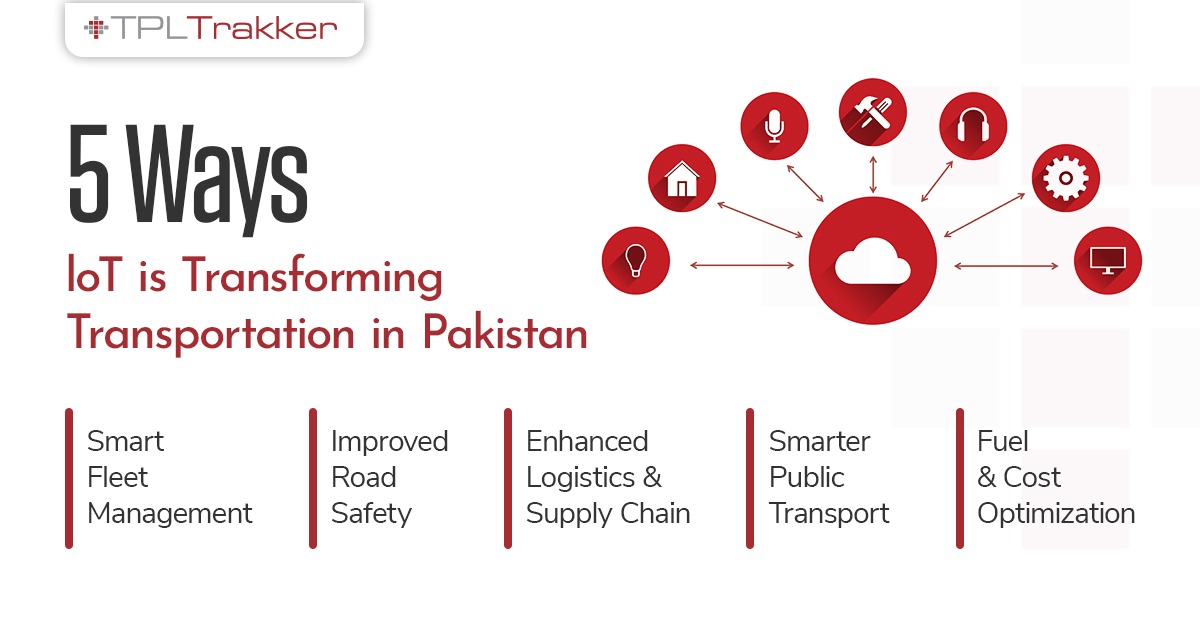
IoT is Transforming Transportation in Pakistan is undergoing rapid change. Squeezed by rising fuel prices, traffic congestion, and safety concerns, both companies and travelers seek smarter solutions. That’s where the Internet of Things, or IoT, is stepping in, turning the way we track, manage, and improve vehicles on the move.
From trucking to ride-hailing, IoT is making real-time monitoring, predictive insights, and safer trips the new standard. Here are five forces that show how IoT is reshaping the roads in Pakistan.
1. Smart Fleet Management
The largest impact of IoT is in fleet management. Logistics firms, delivery apps, and bus operators now rely on IoT GPS trackers and telematics gadgets to:
- See every vehicle’s exact point on a map, live
- Cut fuel burn and downtime on long waits
- Pick smarter, quicker routes that save fuel and hours
- Hold drivers more responsible
By working with outfits like TPL Trakker, companies are lowering extra costs by 20%–30% while making each fleet more effective.
2. Improved Road Safety
Pakistan’s roads are dangerous because of reckless driving and beat-up vehicles. Smarter tech, via the Internet of Things (IoT), is stepping in with:
- Devices that spy on driver habits, like speeding and slamming the brakes.
- Immediate warnings are sent to the driver’s phone if they drive dangerously.
- Sensors that check the engine and tires, predicting issues before they happen.
Together, these tools reduce crashes and save both vehicles and lives simultaneously.
3. Enhanced Logistics & Supply Chain
IoT is a game-changer for shipping in Pakistan. Small gadgets and sensors now let firms:
- Track every parcel on a live map to ensure nothing is late.
- Verify that cold food is stored at the correct temperature to maintain its freshness.
- Spot theft and reroute trucks, using secure and smart tracking.
For online stores, groceries, and stores across the country, IoT is the reason customers trust that their orders will arrive on time and intact.
4. Smarter Public Transport Systems
Pakistani bus riders know that on-time arrivals are a myth and service often fails. IoT is providing some welcome fixes, like:
- Live bus maps so passengers know exactly when to step outside.
- Automatic fare boxes to speed up boarding and reduce waiting in line.
- Intelligent route planners that dodge traffic jams before they even start.
Cities like Karachi and Lahore are implementing these smart ideas to ease commutes and alleviate gridlock.
5. Fuel & Cost Optimization
Climbing fuel prices worry every transport operator in Pakistan. The Internet of Things (IoT) eases the pain by:
- Tracking how much fuel each vehicle actually uses
- Spotting fuel theft and other misuse in real time
- Planning driver routes that burn the least diesel or petrol.
When firms install IoT-driven fuel monitoring systems, they cut costs by millions of rupees each year and leave a smaller carbon footprint.
Conclusion: IoT is Transforming Transportation in Pakistan
IoT isn’t science fiction anymore—it’s already changing the transport scene in Pakistan. Thanks to smart vehicles, safer roads, slicker logistics, and lower bills, the technology is putting a smarter, better-connected future on every truck’s dashboard.
Pioneers like TPL Trakker are accelerating progress by delivering top-notch IoT and telematics tools that give firms the edge they need against tight competition.
